The Doctor: First Doctor (William Hartnell)
The Companions: Susan (Carole Ann Ford), Barbara (Jacqueline Hill), Ian (William Russell)
In-serial companions: Sabetha (Katharine Schofield) and Altos (Robin Phillips)
The plot: The TARDIS crew take on a quest to find keys to a mind control machine
Written by: Terry Nation
First aired: 11/04/1964-16/05/1964
Continuity: None
Season 1, episodes 21-26 review
One day two schoolteachers from Coal Hill highschool walked into a magic box and flew away. They had many adventures as they tried to find their way home.
When I think back on the first season of Doctor Who I remember the pilot, The Daleks and the excellent The Aztecs. It says something about the quality of the chaotic The Keys of Marinus that I had no memory of it at all.
As mentioned before, the first season of the show was filled with a scrabble for stories as concepts fell through, scripts were delayed and episodes needed to be cobbled together harriedly from thought bubbles. The Keys of Marinus was a last-minute replacement serial and, after the success of The Daleks, it’s possibly no surprise that they asked Terry Nation to do it. He devised an episodic quest that would send the Doctor and his companions to different locations in search of the eponymous Keys of Marinus.
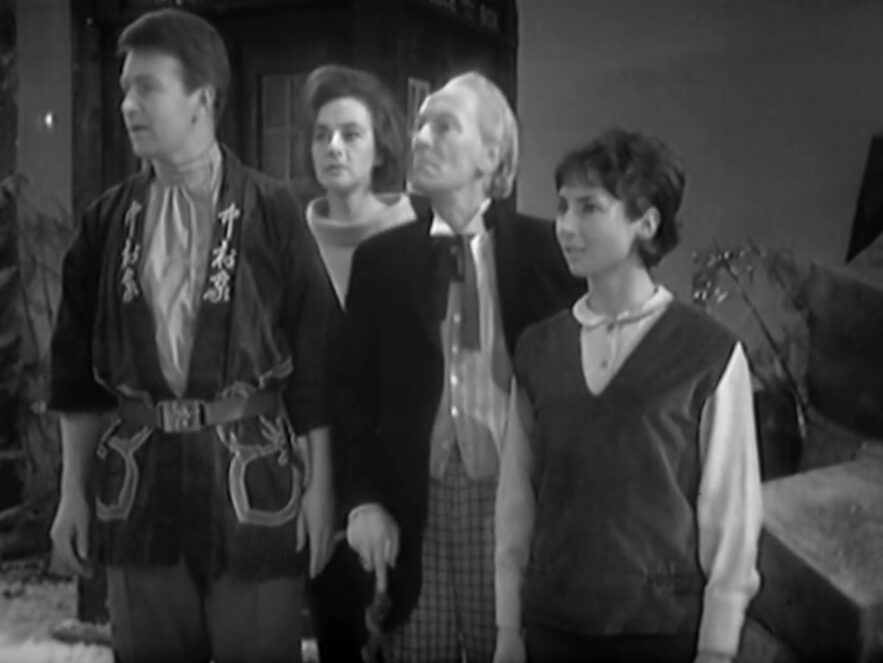
It’s essentially five different episodes, each self-contained with an common story thread about locating the local Key. And, like a classic quest, the danger faced by our travellers is more mythic than scientific: beguilement, entrapment, and mazes. The Keys of Marinus is more redolent of Greek myths or Arthurian tales than science fiction, even if the Questors are seeking micro keys instead of the Grail. And the comparison raises the possibility of Doctor Who being essentially an Odyssey; with our protagonists lost in space and time, overcoming challenges while they try to get home.
The serial starts when the TARDIS lands near a Citadel surrounded by an acid sea. It’s the planet Marinus and they soon meet Arbitan: a lonely old man who keeps watch over an artifact called the Conscience Machine that used to ensure justice throughout the lands by overriding free will. The Citadel is under siege from a people called the Voords.
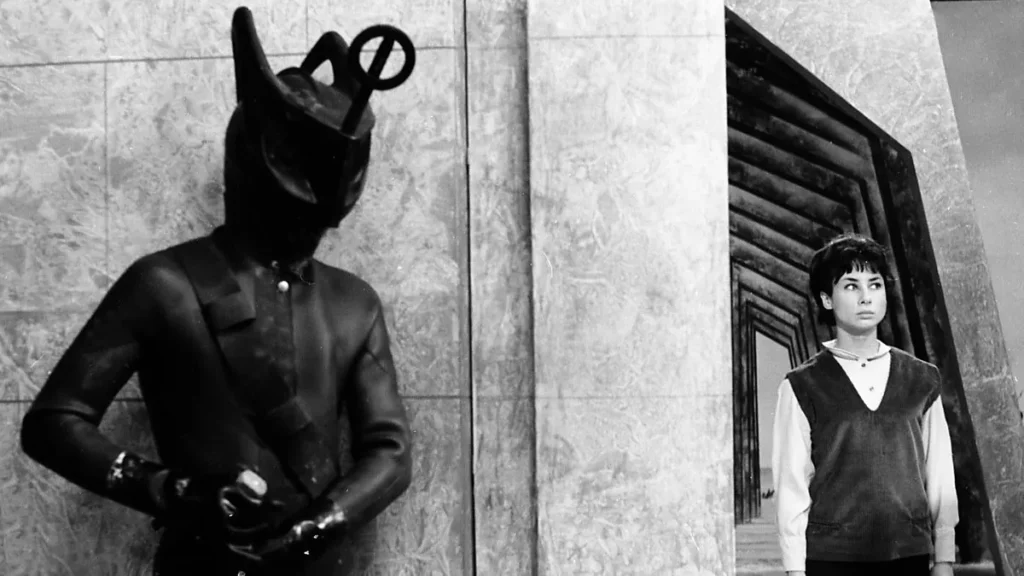
After a small bout of blackmail and threats of death, the group are dispatched to find the Keys that Arbitan has scattered to the four winds. They’re needed to power the mind control machine that Arbitan has reprogrammed to enslave the rebellious Voords. For some reason our TARDIS crew don’t question this clear dystopia so I guess the audience is supposed to handwave it as well. Yay for centralised mind control run by a man who uses extreme coercion to get what he wants! Our team is definitely on the right side of history here.
Armed (literally) with portable teleporters called Time Dials, the TARDIS crew jump first to Morphoton; a seemingly idyllic paradise with charming hosts and an abundance of luxuries. While the intoxicating trap the crew falls into seems Homeric, it is perhaps more redolent of Viking myths of the Fey. Yet the sets and costuming are definitely Greco-Roman and Barbara lounges around on a recliner eating grapes like Cleopatra.
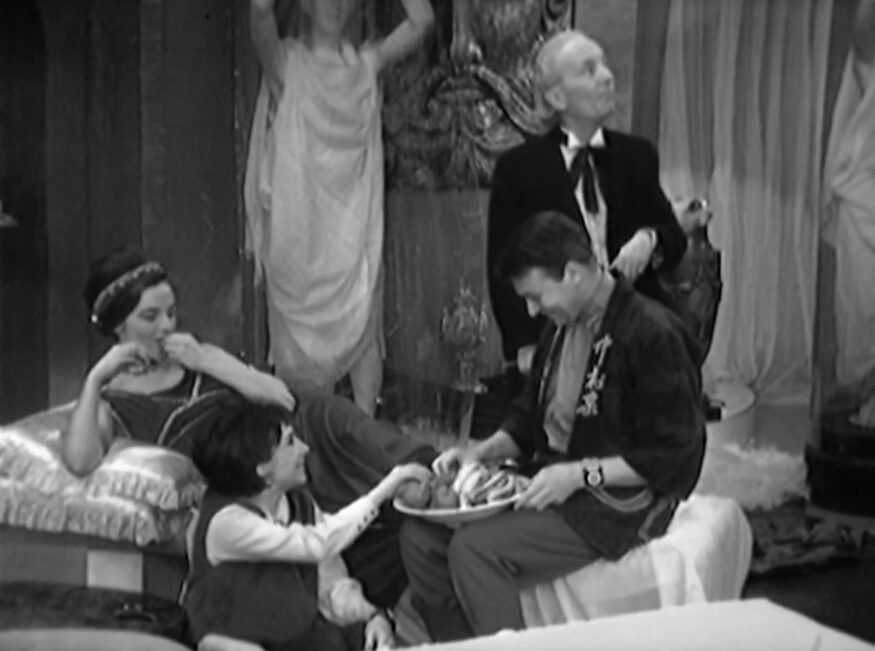
Our travellers have stumbled into the home of Tricksters who beguile them with everything they could ask for: rich food and wine, luxurious clothing and, for the Doctor, a well-stocked laboratory for him to work in.
Nonetheless, all is not as it seems. As Barbara comes out of the hypnotic trance the others have fallen into, she realises all is an illusion. The food is rotten, the rich clothing rags and their gracious hosts slavers looking for beguiled human bodies to work for them.
Also, brains in jars.
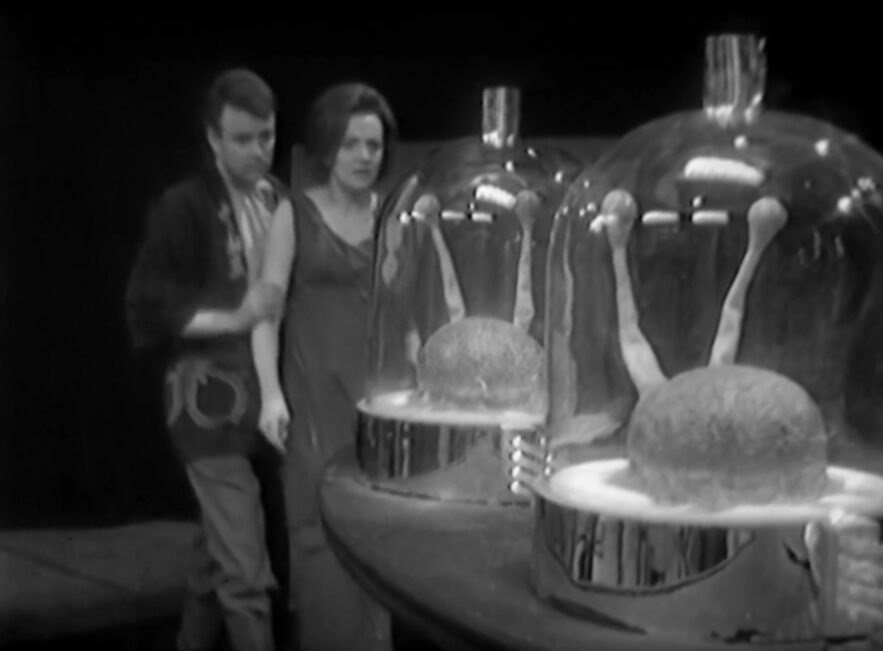
It’s so schlock scifi, I kind of love it.
How and when the genius disembodied Morphos came to Morphoton and enslaved the humans is unspecified, as is why and when Arbitan chose to hide a key there. But it says something that they used a method similar to the Conscience Machine that our group is trying to fix. Or at least it would if the show ever seemed to be exploring this as a theme. One is left wondering if Nation simply didn’t notice the contradiction in condemning the Morphos while portraying Arbitan’s quest as somehow noble.
Either way, even hypnotic genius brains with eyes on stalks are no match for Barbara with a blunt object and so the people of Morphoton are liberated. At least until the Conscience Machine gets turned on again…
Back in the Citadel, meanwhile, Arbitan is murdered leaving the Voords in control of a machine they now plan to reprogramme to their advantage. It’s almost as though a giant mind control machine isn’t the best idea generally.
As our heroes (or more specifically Barbara) free the enslaved citizens of Morphoton, they also rescue Arbitan’s daughter, Sabetha and her friend, Altos, another quester sent by Arbitan to find the Keys. The Doctor decides to save some time and jumps ahead to the final destination while the rest of the group jumps to the second location.
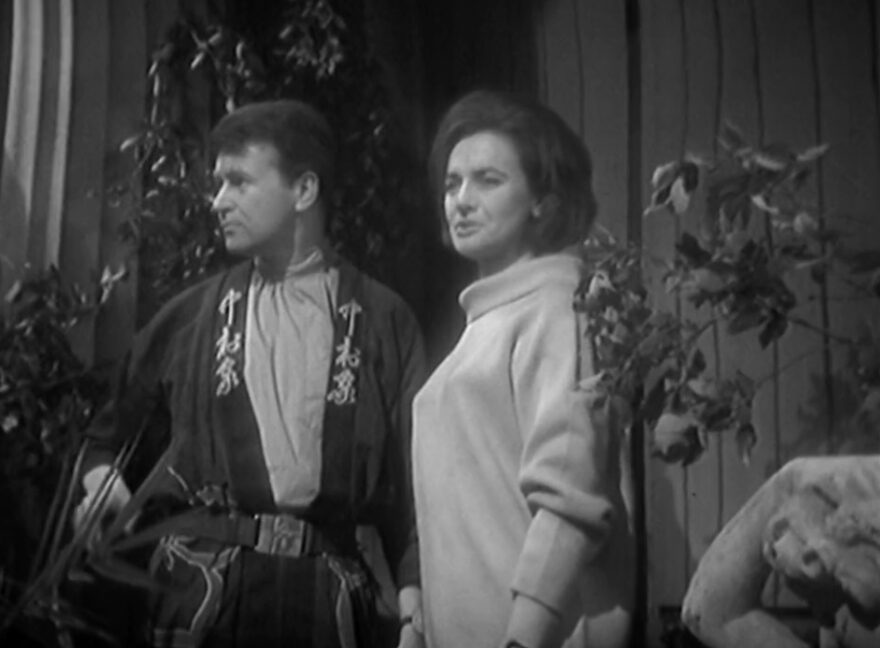
Susan – who behaves throughout this serial as a cossetted 10-year-old rather than the 16-year-old well-travelled Timelord she apparently is – collapses in terror and agony as the living, psychic jungle they transport into screams into her nascent telepathic brain.
Unable to stand it, she and the two new companions head to the third quest while Ian and Barbara stay to find the Key hidden in the centre of what turns out to be a Labyrinth of nasty traps. The ongoing imagery here is Greco-Roman as Nation continues to portray this narrative within the framework of an Homeric odyssey.
The Minotaur at the centre of this maze of traps is a scientist, Darrius, who has been experimenting with plant growth; experiments that have resulted in the rampaging forest outside. The traps were set to protect the Key and were known to Arbitan (who really could have taken more time to brief our travellers before sending them on their way).
Darrius and his work are being destroyed by his own creation as the jungle is slowly breaking down the building that protects the key. Darrius tells them where to find what they’re looking for and to beware the forest screaming before he dies.
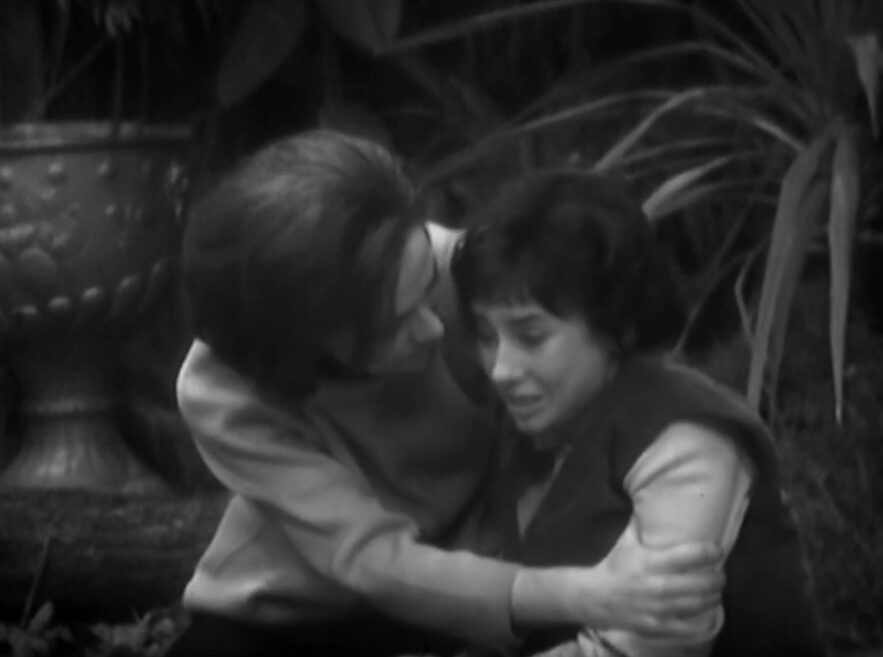
As night falls and the forest’s screaming becomes audible, Ian and Barbara find the treasure they seek and leave just as the attacking flora overwhelms all.
Cold and snow and wailing winds greet Ian and Barbara as they find themselves on an icy tundra pursued by wolves. They are given shelter by the menacing, hulking trapper Vasor who sends Ian off to his death while threatening Barbara with imprisonment and rape. It’s an unexpected and darkly realistic moment for a fantasy serial – one that later has casual domestic violence in the city of Millennius.
The dark, the cold, the ice, the giant and the wolves for once seem more Germanic than Greco-Roman and it’s no surprise that this quest in particular feels more Arthurian legend than Homeric epic poem.
Ian and Altos come back for Barbara and order Vasor to take them to the caves where they find Sabetha and Susan. Vasor claims the caves are inhabited by demons. The ‘demons’ turn out to be Ice Soldiers protecting a Key frozen in a block of ice: the imagery further re-enforcing the Arthurian framing of this particular quest.
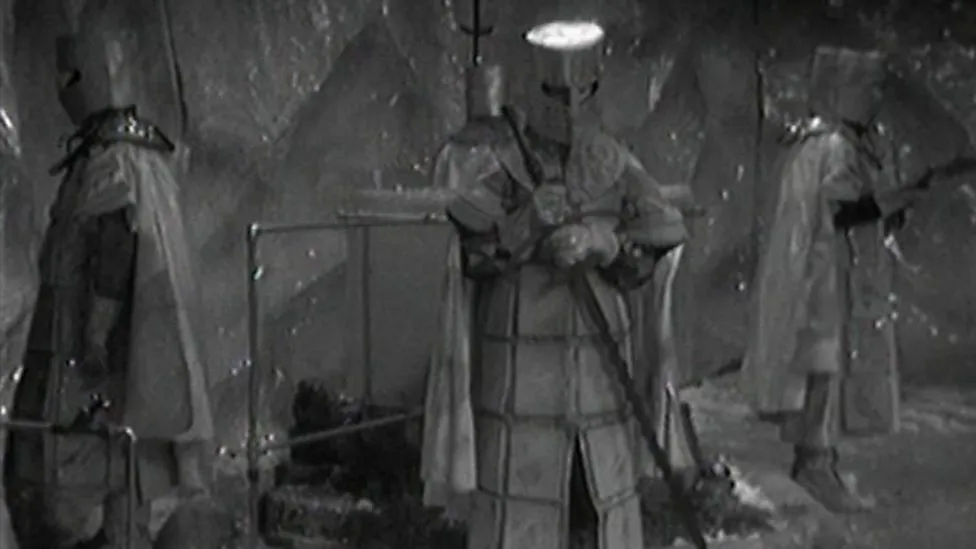
The questors manage to free the Key from the ice but not without reviving the Ice Soldiers, who chase them to retrieve it. Once again, Arbitan presumably set up this trap and no doubt had a way to retrieve the Key more easily; a solution he failed to tell even his own daughter. Arbitan is definitely not the hero of this story.
Vasor is killed by the Ice Soldiers, in the universe’s most unlamented death, and the gang escape with the Key using their Travel Dials. As Ian arrives in the city of Millennius, he finds the key in a case next to a dead man. He is of course falsely accused of murder. It turns out this city-state is one where the burden of proof is reversed and the Doctor has to defend him before he is inevitably sentenced to death.
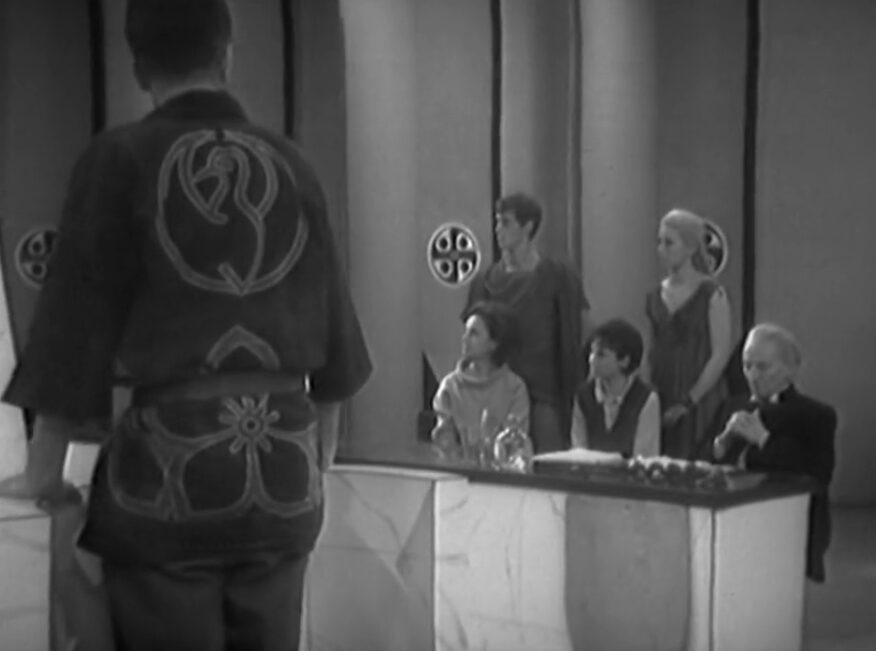
It’s all a nefarious – and not entirely sensical – plot by denizens of Millennius to get the Key and… sell it? Not much about this indictment of Kangaroo Courts makes much sense of course but the Doctor has been hanging around Millennius for a while and has picked up enough to at least mount a defense for his companion.
And he is his companion now, this much is clear. While the Doctor remains arrogant, capricious and self-important, his horizons have expanded considerably since taking aboard his new travel friends.
Still, one wonders how the society of Millennius has such a highly-developed and embedded legal system for a society that until recently was controlled by the Conscience Machine. If The Keys of Marinus could be said to have a theme about justice and free will then Millennius’ perverted system of legal abuses slots in there somewhere, although it possibly demonstrates the need for something like the Conscience Machine. And that raises a number of interesting and varied ethical questions.
Our questors finally prove Ian’s innocence and retrieve the key only to return to a Citadel where Arbitan has been murdered and the Voord, Yartek, has control of the machine. While the rubber-suited, acid-diving antagonists try to trick the group into believing Arbitan is still alive, they are not fooled and hand Yartek a fake key.
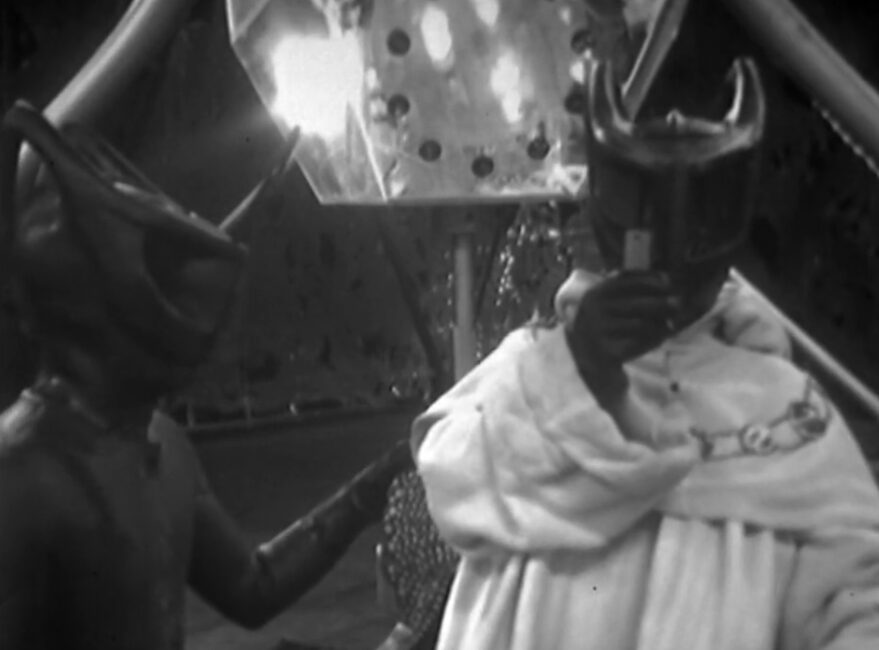
The Conscience Machine is destroyed, which… changes nothing about the power dynamics of Marinus’ geopolitics but does mean our dauntless crew can leave. Not before the Doctor delivers some homespun wisdom about “not being controlled by machines”. Yeah, I don’t think the machines were ever the problem here, Doc. You do remember Millennius and its Kangaroo Court, right? That was only a few hours ago.
Machines can make laws but they cannot preserve justice. Only human beings can do that
The Doctor, showing he was not paying much attention to the plot
As our companions bid their new friends farewell and troop into the TARDIS, their episodic quests within the greater quest complete, they leave a Marinus unchanged by their passing except that some Keys are no longer hidden in improbably complicated ways.
I stand corrected – the grateful Morphotons are free and the instances of widespread mind control on Marinus are now zero. So I guess our quest was not entirely in vain.
While I can snark about The Keys of Marinus for various reasons (not the least of which is its ultimate pointlessness: narrative busy work driven by MacGuffins to fill a void left by other unrealised stories) it is certainly enjoyable. There is nothing wrong with a romp every now and then and that’s what this was. A series of mini sci-fantasy films that don’t stand up to scrutiny but do have a lot of running around.
And a nice circuit breaker before the powerful historical, The Aztecs.
One thing Marinus also achieved is to solidify the framing of early Doctor Who as an Odyssey. Their journey is not easy nor in a straight line but Ian, Barbara and the Doctor also are just ultimately trying to get home.

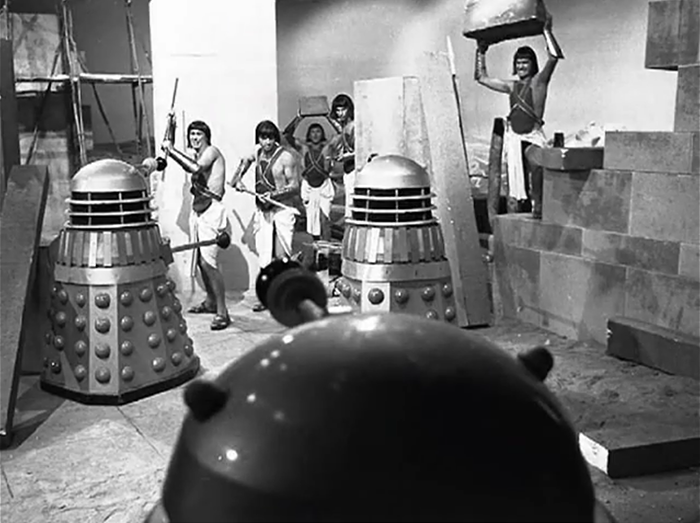
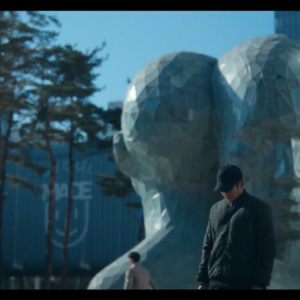
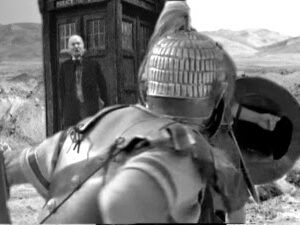
One thought on “The Keys of Marinus: Doctor Who, S1 Serial 5”